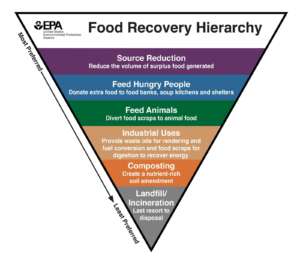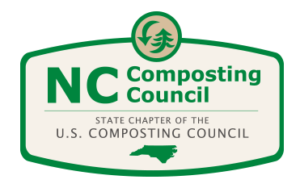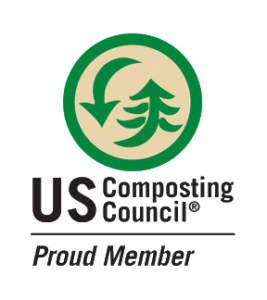Cary Composts
A community that builds its soil, builds its future.
Did you know…
- Wake County’s landfill is expected to hit capacity by 2040. Help lengthen the life of the landfill by decreasing your waste through composting.
- A 2019 study (See pages 28-30) of the South Wake Landfill determined that 27% of Cary’s residential waste sent to the landfill is food. And, up to 44% is anything compostable (think pizza boxes and soiled paper goods). Help change that by encouraging composting across our town!
- Food waste in the landfill emits a greenhouse gas called Methane, one that is more potent than carbon dioxide. Although the South Wake landfill captures methane, this system takes up to a year to be put in place. During that time a significant amount of methane has already been released into our atmosphere…
- 40% of all food produced in the US is wasted.
- The EPA’s Food Recovery Hierarchy helps individuals and organizations prevent and divert food from going to the landfill.
- The EPA and USDA set a Food Loss and Waste Reduction Goal of 50% by 2030.
- Using finished compost:
- In land-use management helps soil retain more water
- Lowering watering needs in times of drought
- Preventing runoff in heavy rains
- In agriculture, farming and gardening adds nutrients to soil
- Enriching our soil and increasing the nutrition level of food grown in that soil
- Eliminating the need for fertilizers
- In turf maintenance
- Decreases impact of head injury on playing fields
- Decreases need for herbicides on golf courses, parks and yard
- Sequesters carbon pulling it out of the atmosphere and back into the ground where it belongs
- In land-use management helps soil retain more water
- One of the recommended actions in the 2020 Wake County Comprehensive Solid Waste Management Plan was to “invest in a central, full-scale composting system” (See section 4-8)
- Composting can be inexpensive, low tech, and solves multiple problems? Nothing in Nature is Wasted.
Use the Compost Did You Knows and Community Spotlights to contact your Town and State representatives and ask for more composting options!
This video shows why composting in our communities is so important.
Community Compost Spotlight:
“Look who’s leading the way!”
NC State University
Take a peek at NC State’s closed-loop
composting system that has been
operational since 2019!
Click HERE to learn more.
Greenville, SC
Check out Don’t Waste Food SC, an initiative focused on preventing, donating, and composting to reduce food waste in Greenville County.
Click HERE to learn more.
App State University
ASU has been composting since 1999, a program that started as a student led initiative!
Click HERE to learn more.
Austin, TX
Austin’s curbside compost program is part of its zero-waste goal to divert 90% of materials from landfills by 2040.
Click HERE to learn more.
Baltimore, MD
Baltimore has a multifaceted approach to composting and harnesses the power of community partners to help reach their goal of reducing food waste 50% by 2030.
Click HERE to learn more.
Cambridge, MA
In the first year of their citywide curbside composting program, Cambridge reduced their greenhouse gas emissions the equivalent of not driving 2.7 million miles!
Click HERE to learn more.
Eugene, OR
Eugene’s residential food waste collection program allows residents to place food scraps in with their yard waste.
Click HERE to learn more.
Durham, NC
Durham began a pilot curbside composting program for up to 100 families earlier this year – the FIRST in our state!
Click HERE to learn more.








